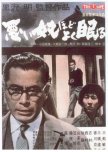
This review may contain spoilers
"People today have forgotten that they are really just part of nature."
Over eight vignettes from Kurosawa's Dreams, you'll float through surreal settings with dolls come to life, tremble from the hellish landscape of a post-apocalyptic war and sit by a soothing river where life flows by, the past, present and future. Many of Kurosawa Akira's familiar themes run through the stories and some you may find more meaningful or interesting than others. If you've ever wanted to wander through a Van Gogh painting this is the film to do it with.Kurosawa begins the film with a wedding with possibly tragic consequences and ends the film with a joyful funeral. The old film master certainly likes to shake things up when he bookends stories. The first two dreams are when the central character standing in for Kurosawa, I, is a child. In "Sunshine Through the Rain", young I disobeys his mother and runs off to watch a Fox wedding procession leading to one of the most beautiful and disturbing scenes in the film. "Peach Orchard" has little I confronting the spirits of the peach trees his family had cut down. The spirits have taken the form of his sister's dolls and have mercy on the young boy due to his love of the lost blossoming trees. The spirits cause the trees to bloom momentarily in a most creative manner.
The next dreams feature an adult I. In "The Blizzard", four explorers are caught in a deadly snow storm. One by one, they succumb to the cold and fall asleep even as I encourages them onward. A mountain spirit attempts to lure I to sleep and he must resist or they will all die. "The Tunnel" sees I returning from WWII and walking through a long rural tunnel. He's confronted by a bloody grenade carrying anti-tank dog, then a private who had died in his arms. Finally, his whole ghost platoon confronts him. He must deal with his guilt and grief of being the only survivor as he faces his men.
In "Crows", I is an artist who travels through Van Gogh's paintings and meets the great artist. What he finds is a man driven to madness by his need to work and create the perfect paintings in his mind on the canvas. Perhaps the story is a reflection of Kurosawa and his own relentless drive to work. He too, had contemplated suicide, but went on to survive and continue his artistry.
The next two dreams are dark and as subtle as the old man in his I Fear to Live. In "Mt. Fuji in Red" Japan is ruined by the explosion of a nuclear reactor which covers the island in radioactive clouds. I and the people he is with have no place to run and one decision to make. Do they choose to die quickly or slowly? "The Weeping Demon" has I traipsing through a barren wasteland burned away by a nuclear war. The only life are giant dandelions and avaricious survivors with horns forced to devour one another to survive.
In the last dream, I crosses a narrow wooden bridge over a pristine river with waterwheels flanking both banks in "Village of the Water Mills". He comes across an old man fixing one of the wheels and discovers they use no electricity and have no need for scientific inventions. Most of the villagers live until they are very old due to their simple healthy way of life. The old man leaves I to join a rousing processional for a villager who has died, a celebration of the fulfilled life she had led. Kurosawa took us from cynicism.
Kurosawa's signature fog and wind showed up in most dreams, from the gentle rain misting in the sunshine, to the blinding blizzard on the mountain, to the colorful radioactive winds after the explosion with Mt. Fuji ablaze in orange and red. Many scenes were either brilliantly swathed in colorful flowers or menacingly gray and windy, never letting you find a comfortable place to rest.
The music and sounds further brought the scenes to life. The heavy breathing of the explorers in the howling wind, fighting for each step in the waist deep snow portrayed their desperate situation and resolve to live. Something as benign as footsteps became utterly haunting as the officer stood at the tunnel hearing the footsteps of his platoon coming toward him echoing louder and louder and later growing fainter and fainter. Several vignettes used stylized music and dancing, makeup, and costumes, reaching back into the past for inspiration.
Kurosawa covered an emotional diversity during his wedding, 2 apocalypses, and a funeral--- forgiveness, survivor's guilt, human resilience, and love for nature, as well as human greed and hubris. As he often did, he showed how the powerful materialistic upper tier with their out of control technology and self-absorption might destroy everything and everyone. Because of the captains of industry and their willful destruction of the environment they would be given a special hell to live in. Those who made friends with nature could live peacefully and well. If we take care of the environment, it will take care of us.
While I loved the sentiment of the final vignette, humankind will need to evolve much higher to do away with hate, envy, and the need for power. Inventions themselves are not always a bad thing, they can be very useful. As quickly as technology develops though so does our need for greater wisdom and love. Simply abandoning technology will not be enough.
Dreams took us on a trip through the river of time into the past, alternate planes of existence, and to possible futures. Whether this film comes across as a self-indulgent exercise by the director or a fascinating look into the beliefs about humankind and art by one of the 20th century's finest directors will be up to the individual. Even though he could be heavy handed at times or completely enigmatic I found the dreams thought provoking, creative, and a delight for the eyes.
2/17/23
Was this review helpful to you?

This review may contain spoilers
"I guess you're smarter than you look"
Big hitter ahjussie, Ma Dong Seok, returned as Detective Ma in this old school smash mouth action film. This time he took on a Big Bad who had been kidnapping and murdering Koreans overseas. Strap into your seat and brace yourself because with Ma at the lever it was going to be one wild ride!The story begins in 2008 after the turmoil of The Outlaws. Detective Ma and his boss, Jeon Ill Man, travel to Vietnam to pick up a Korean crook to bring back home to repatriate. Ma's not buying guilt as his reason to want to return home and before you can throw a 1-2 punch Ma and Jeon end up neck deep in bodies. The blood-soaked path quickly leads to the murderous Kang Hae Sang as the Big Bad in charge. Before long good guys and bad guys are headed back to Korea with the action never slowing down.
Though there are some blood spurtingly, bone crunching, gorey battles, especially when Kang Hae Sang is around, Ma's brand of humor always lightens the mood to keep the movie from becoming too dark. The story is well paced, never allowing your attention to stray. A few familiar faces from the last film return to help Ma out in this one and provide a punching bag when needed.
There are plot holes and some parts of it are ridiculous. Despite that I literally laughed out loud on numerous occasions. It could also be gruesome, I had to close my eyes during one of the more vicious fight scenes as well. Ma Dong Seok is so charismatic that he owns every scene he is in. He is pure joy to watch saunter and put the beat down on baddies. When asked if he wants to split some stolen loot down the middle, without making it sound cringey, he replies, "The middle of who?" Son Seok Koo made for a properly ruthless baddie who never met a person he didn't want to stab. At times he seemed as unstoppable as a T-1000, until he was confronted by a Ma-10,000.
The Roundup might have been predictable, but so is a rollercoaster. I don't mind knowing where it is taking me as long as it gives me some thrills, laughs, and excitement along the way. In this, The Roundup did not disappoint.
2/16/23
Was this review helpful to you?

This review may contain spoilers
"Everyone wants to be with family"
If I thought the original Monster Hunt was a fevered sugar dream, Monster Hunt 2 said, "hold my soda." The first Monster Hunt movie had plenty of death and some monster gore. MH2 replaced the darker elements with more cuteness and bodily function jokes. MH1 threw as many movie themes as they could at the screen to see if something would stick. MH2 decided to not develop or continue most of the mysteries from the first movie and just went with "Ohana means family" to quote Lilo and Stitch.MH2 begins after new couple Song and Huo left baby squid monster Wuba in the Monster Realm for his own good. In their gender reversal of roles, Huo continues to berate Song as the woman ever since he was pregnant with the radish monster. Song, despite his use of his father's sword in the previous film, is still pretty useless in battle and suffering from postpartum depression. Song and Huo have some second thoughts about leaving Wuba, especially after watching a mother monster and her child after their capture by the Monster Hunter Bureau. Even in captivity the family is happy to be together.
Taiwanese actor Tony Yang plays the helpful head of the Monster Hunter Bureau. He confirms that Song's father disappeared 10 years ago and that wraps up everything about that mystery for this movie. I guess they are saving the discovery of the father for the next one. Song and Huo decide to find Wuba using the mystical method of the MHB. Fortunately, the little fanged tooth monster prince is nearby.
They lucked out because after they left the little radish in the monster realm, the monsters had a rousing Bollywood number crashed by bad monsters after Wuba. The little guy ended up on the run and back in the human realm.
You know there's not enough story when the majority of it is spent on veteran actor Tony Leung Chiu Wai instead of the main characters and dangling plot points from the first film. Despite his film pedigree he fully committed to his role as gambling scam artist Tu who uses monsters to help him cheat, often while he wears outlandish disguises. Aside from a long list of creditors and scam victims, he was also troubled by a love interest he owed money to as well. As movie coincidence would have it, a hunted Wuba is saved by BenBen, Tu's monster partner in crime. There were numerous scams and colorful chases through the businesses and towns, leading the story nowhere. At first Tu is only interested in using Wuba to pay off his debts but even a child could see the redemption story coming from a mile away.
Song and Huo are finally reunited with Wuba, Tu seemingly abandons them, and the real villains reveal themselves which will not be a surprise to anyone. Another story that gains no traction in this film is Wubo's royal blood and how he is supposed to unite the human and monster realms. He also doesn't drink blood in this one as he did in the previous film.
The theme that is repeated ad nauseam is that sometimes parents have to go away to better provide or protect their children but that they always miss them. "There's no greater pain than being separated from family." "Everyone wants to be with family." Perhaps it's because some parents have to leave their children to go elsewhere to work to provide for them, but whatever the source, the film makes sure everyone gets the emotional thrust of the writing.
The costumes and sets were well done, looking almost steam punk in design. The CGI was much improved, the strange monsters combined perfectly with the live action and the green screen use was seamless. All the money thrown at this one after the first film raked it in definitely showed up on the screen. The monster realm's lavender covered tall rock formations were beautiful. Also, both Tonys gave a bit of acting gravitas to the film.
MH2 was an extremely colorful, fast paced, bouncing, spinning, spitting, place holder until the 3rd film inevitably comes out and hopefully answers the questions asked in the first film. Aside from reuniting the little human/monster family and possibly adding a couple of new characters, nothing really happened to forward the story. Though gentler in nature that its predecessor, it lacked the sort of impact that would make it memorable. MH2 was a frothy lesson in style over substance and a sinfully sweet exercise in treading cotton candy until the real story shows up.
2/13/23
Was this review helpful to you?

This review may contain spoilers
What a difference a day makes
A Day takes the tired trope of the repeated day and gives it a karmic twist. Part taut thriller, part redemption story bordering on melodrama more than once, it managed to make all the parts work together to pull off a satisfying story.Kim Joon Yeong is a famous surgeon who travels the world and is on magazine covers and hounded for autographs. At home, his daughter is less than enthralled with his career because he misses important days and times with her like her birthday. Lee Min Chul is an EMT who argues with his wife when she asks about having a baby. Both men are tied up in their own lives and careers and can't see the negative impact they are making on the females in their lives. When both the daughter and the wife are killed over and over and over regardless of how cleverly the men act, they find that there is someone else caught up in their endless day of agony, someone they have also impacted negatively.
Karma comes calling as they find themselves in hell. Because the victims are innocent it's impossible to not root for the men to break the curse and find a way out for their loved ones. Despite their herculean and sometimes murderous efforts the day seems to never end. Kim Joon Yeong finally realizes his part in the bloody drama and what needs to be done to stop the deaths and who actually needs to be saved.
As well made as the film was, the thriller dragged during some of the unremitting days and the bloody streets began to feel repetitious losing some of their emotional intensity. The overwrought score had a tendency to overwhelm the scenes instead of enhancing them. As well as all the actors portrayed their parts, there are only so many tears that remain effective scene after scene. There were one too many scenes played for overly dramatic effect for my tastes. Finally, Kim needs to spend more time with his daughter and tell her about stranger danger and to pay attention to traffic and not ignore her father's desperate requests.
Yet for the drawbacks, I did find much of the story and acting compelling. Redemption tales are catnip to me. There's a reason the film is also named Haru. For though something was taken, something was also given. Where life was lost, life was also created. A Day managed to weave together a story of revenge, grief, rage, and forgiveness culminating into a beautiful ending.
2/9/23
Was this review helpful to you?

This review may contain spoilers
"Life is an unknown course"
Like the languid lapping of the waves against the shore near the quiet fishing village in this film, Director Ozu brings a gentle rhythm to the past meeting the present and directing the future currents for the people involved. Komajura and his troupe of traveling actors will find their lives changed as they navigate their circumstances and decisions in this remote place.Komajura is an aging actor with a less than successful acting troupe. He readily admits their Kabuki plays are not very good. Most of the players have only known the stage for most of their lives. In the sweltering heat of the day, they form a small parade in their costumes as they enter the village, handing out fliers. Some of the men seek out the prettiest women in town to invite to the play. Komajura seeks out an older woman and her 19-year-old son, Kiyoshi. Kiyoshi is actually Komajura's son, but only knows him as an uncle for Komajura doesn't want his son to have a poor actor for a father. Komajura's current mistress, Sumiko, becomes enraged when she finds out about his devotion to his secret family and hires one of the girls in the troupe, Kayo, to seduce the dutiful Kiyoshi setting into motion a wave of changes.
Though Floating Weeds has a romance with the young lovers, the main focus of the story is Komajura as the tides in his life change. He faces the loss of his troupe, his lover, and his son. He lashes out in fury in some of the most violent scenes I've seen in an Ozu film. He is forced to deal with his lack of control over his life circumstances and other people. Eventually, he comes to accept where he is in his life and what his relationships have come to be and that his loved ones will make their own decisions about their lives which he may not agree with. Many of the characters must decide who and where they want to be.
There are two scenes where Komajura becomes violent with the women who crossed him and his son. Though this male dominance may have been acceptable in 1959, it is jolting in this present time and incredibly offensive, making Komajura less sympathetic as he seeks to control the people around him through force. As with all Ozu films, the acting is normally quite restrained, making these outbursts all the more difficult to absorb.
The film itself is a beautifully staged and shot film. Ozu's scenic frames tell a story in and of themselves. They are contemplative, quiet, familiar, giving the characters and the audience room to think and breathe. Many of his frames would make incredible still lifes. His red tea kettle makes an appearance in the barber shop! In a powerful scene, Komajura and Sumiko have it out during a rainstorm. Each stands on the opposite side of the street, unwilling to budge, unwilling to move closer or get wet, unwilling to see the problem from the other's point of view. The words are vicious as the water pours down. Later, in a subtle bit of acting near the end in a train station, the same two actors drop their walls ever so slightly to let the other in as cigarettes are lit and forgiveness is given.
This film is a remake of his silent film, The Story in the Floating Weeds which I have yet to see as the film has no English subtitles. Floating weeds refers to itinerant actors. There were few weeds in this film, if I have any complaints, the movie did begin to feel long as some of the problems were dragged out and it felt as if some scenes could have been trimmed. Most of the acting was absorbing with the exception of the actor who played Kiyoshi. This young actor gave a rather wooden performance.
Ozu was a master of making family concerns and life decisions go from simple to complex to simply masterful. Though this film was not completely centered in a home, Komajura's family both biological and extended family with the troupe was explored. Ozu never ventures far from home and hearth, simply showing us different views of it. There is something comforting in his movies, we come to know the people and their struggles, their strengths and weaknesses, sometimes even see ourselves in them as they try to make the best of their lives. Komajura tells his old lover, "Life is an unknown course." The longer we live, the more these words resonate.
2/7/23
Edit—I have since watched and reviewed the original silent film.
Was this review helpful to you?

This review may contain spoilers
It is a terrifying system that will never yield
Director Kurosawa takes aim at greed and malevolent corporate and bureaucratic power in The Bad Sleep Well. He sends one man tilting at that explosive windmill in an effort to enact revenge and seek justice. Inspired by Hamlet, dare we even hope Mifune Toshiro can topple the unseen forces driving the action in this film?If the opening scene seems familiar, it’s because Francis Ford Coppola raved about it and the opening scene for the Godfather was inspired by it. A wedding reception for a young couple is overshadowed by the corporate cronies and executives preening for Iwabuchi, the Vice President of the company whose daughter Yoshiko married his male secretary, Nishi. A cake in the shape of the building where a man jumped (or was pushed) to his death five years before is wheeled in with a rose protruding from the deadly seventh floor window. As the reporters in the background share their cynical and fairly accurate take on the people involved, they give us the exposition we need to catch up with who we should be wary of- the "clean-up crew" of graft and why the cake is an omen.
It takes nearly 35 minutes for Mifune Toshiro to have his first lines and tell us what we are already suspect. He is the son of the murdered man and is orchestrating a complex revenge plan against the men responsible, even going to the lengths of marrying his enemy's daughter.
Like the mob looking for bribes, the Public Corporation for Land Development has been taking money and kick-backs from companies, most recently a deal with Dairyu. And like the mob, those at the top are untouchable, their subordinates completely loyal, and those who fail or question are expendable.
Nishi is willing to sacrifice everything, even his own sense of morality, to bring down the men who murdered his father. "It's not easy hating evil. You have to stoke your own fury until you become evil yourself." He's aware many of the things he's doing are illegal he’s and more than willing to go to prison if he can succeed with his plan. His fatal flaw is underestimating not only the murderous intent and moral bankruptcy of his adversary, but also the sheer size of the invisible evil that looms just out of sight. When everything looks like it's going Nishi's way, that justice will prevail, one crack threatens destruction.
Though Nishi has no issue ruining Public Corp's pawns-Wada, Shirai, and Moriyama, he does have lines he will not cross. The Vice President and the master he answers to, have no such compunctions. Nishi lacks the hate his enemies have. He doesn't realize that what he thinks is a monolith of power is connected to others and there is no way out without being crushed by their cruel intentions. Unlike Ikiru who broke through the bureaucratic wall, Nishi broke his body against it. It was not like he wasn't warned. "It is a terrifying system that will never yield," Wada warned him. This corporate ronin replied, "Everyone feels that way and gives up. That's how they get away with it."
Another flaw for the main character is that Nishi fell in love with his wife. Yoshiko is so innocent and useless that it is hard to feel sorry for her and easy to feel rage when she becomes the linchpin of doom.
I have no complaints with the hopeless tale of revenge. It takes more than a son's vengeful anger to bring down city hall or in this case government and corporate entities. My issue is that what could have been the most poignant event in the movie happened off camera, taking all the emotional punch out of it. This was one of those times when we should have been shown not told.
Kurosawa gave us a brutally unforgiving film about one man standing up to the corrupt machine. He was unflinching in showing how such power can crush those who oppose it and innocent bystanders along the way. Despite the flawed issue I mentioned, overall, I found the film tragic, well written, well-acted, and captivating. The film is even more meaningful because those bastions of power and avarice have only grown stronger and larger since Kurosawa's day. As he said, "I made this film too soon."
1/31/23
Was this review helpful to you?

This review may contain spoilers
Grandma what big teeth you have!
The Wolf Brigade could have been an interesting movie about a rocky reunification between North and South Korea with politicians and civilians pulling in different directions. What we were given was a mess of a story that could never quite figure out what it wanted to be.The Wolf Brigade is a high powered, deadly force of men whose job it is to crush the sect opposing reunification. It’s not their job to care if the people are innocent or should have a voice in their country’s future. But there’s always one guy whose conscience can’t be stomped out and Lim is that soldier. This story ends up being his story of independence and redemption.
If the movie hadn’t started out with nearly an hour of what turned out to be largely confusing and at times boring exposition, I would have rated it higher. Instead it didn’t get any traction until an hour into the movie. A movie shouldn’t take an hour to figure out who was going to be the focus of the film.
After the exposition was out of the way it became a straight action film with almost zero character development or explanation yet I did become caught up in the typically unrealistic gun fights and car chases. Some of the fights did drag on too long. There was a lot of carnage.
The cinematography, sets, and costumes were all high quality and the acting was on point for this type of film.
I feel like my score is just for the second half of the movie and I should have rated it lower given the convoluted plot and lack of character development.
One character said, “We aren’t humans in wolves’ clothing, we are wolves in human clothing.” I’d have to disagree as he was giving wolves a bad name. Humans need to own their own deadly and bad behavior. And the writers needed to own their responsibility for a story that could have been much better.
12/8/22
Was this review helpful to you?

This review may contain spoilers
Whose got the weed killer and a giant fly swatter?!
Louis Koo and his production company produced Hong Kong's biggest Sci-Fi movie to date. A CGI extravaganza, Warriors of Future pits man against nature in a dystopian future not too far away.Due to man's greed and technological negligence and nearly endless robot wars, the planet's water and air have become polluted to the point of toxicity. Great domes are being built over the cities to try an give people a healthier environment. All seems to be going well when a meteor hits and a giant plant starts taking over. On the plus side, the plant is cleansing the air. Hong Kong now called section B-16 will be destroyed by the planted dubbed Pandora when the next rain hits. Carina Lau's military character is wanting to drop a bomb on the plant that will kill 160,000 people. In come Louis Koo and Lau Ching Wan to save the day by going into the belly of the plant to set off a bomb with a virus which will make the plant go dormant. No problem, right? Aside from the plants deadly ability to defend itself, it also has a host of giant bugs at its disposal. Throw in a traitorous human's evil doings and the good guys have their hands full. Phillip Keung also appears as a man in need of redemption.
The problem with Warriors of Tomorrow, aside from its obvious lack of an article (at least one "the") in the title, is that it dumps the viewer into the middle of the story. I can only guess that they thought the audience only wants to see the battles. The movie would have benefited from us feeling the relief of the domes being built along with the people and then the devastation of the meteor hitting and the giant plant erupting and destroying cities. We weren't there when the race to find a way to destroy or slow the plant was developed. Instead, we are told this information in flashback along with Koo's brief backstory and thrown right into the battle. There was little ebb and flow, just high speed, high tech fights against other tech and the enormous flora.
Koo, Lau, and Keung all gave emotional, compelling performances. Much of the rest of the cast came across deadpan and stilted. There was little humor to break up the lethal action. The CGI was actually high quality, especially for a Hong Kong film, and it's a good thing because there was a lot of CGI spectacle from beginning to end.
I actually found the movie entertaining, even if the writing let it down. It was obviously highly influenced by other films. I almost found myself quoting those films when the similar scenes popped up on the screen. I wish they'd spent as much time and money on the writing for the film as they had the sets and CGI. This would have been a far better film if they had.
In the end, who doesn't like to watch a bunch of men in metal tech take on an invasive plant species and carnivorous bugs. Anyone who has had to deal with kudzu and/or fire ants might feel the need for such superior hardware themselves. There are better movies in this genre, but for a first try it still managed to be fun.
12/6/22
Was this review helpful to you?

This review may contain spoilers
"Of all the poisons, men are the most dangerous!"
Monkey King 3 took up where Monkey King 2 left off. Aaron Kwok returned as the Monkey King along with Feng Shao Feng, Xiao Shen Yang, and Him Law. Zhao Li Ying joined them this time as the Queen of the Women’s Kingdom.Wu Kong, Pigsy, Sandy, and Tang Seng are heading west on a river when a river demon assaults them. There’s an old joke, “You can lead a horse to water but you can’t make him ski.” This was as close to a skiing horse as you are likely to see! With the help of the goddess they escape and go from the frying pan into the fire. They crash through the portal into Woman Land where Tang Seng and the Queen seem to fall in love as they plummet down a mountain. The Preceptor, a very uptight woman dressed in white, declares the men must die because they have made the cardinal sin…of being men. Men’s love is poison to a woman and it’s looking like the Queen might have been infected. She rescues them during their execution and they seek to find a way out of the spell dome over the land.
The CGI was good for the most part and there was a lot of it. Woman’s Land had beautiful dwellings and strange monsters abounded.
Aaron Kwok is the best Monkey King I’ve seen. Too bad he had very little to do in this movie. This story was more of a romance and spiritual trial than adventure. Even the “villain” was just misunderstood and hurting. Tang Seng and the Queen had to decide between love and duty as did the Preceptor. Even if you are like me and only know the story from the movies, the ending was inevitable.
I had reservations about certain aspects of the story. The one whom the Preceptor had loved during her youth was an androgynous river god. Years before because of her duty to the new queen, the Preceptor had to reject the river god who then became unproductive, obsessive and wrathful. The spirit who could cause miscarriages appeared to be a man in woman’s clothing which was played for laughs. Not very 2018 of them on either count, neither was portrayed positively. The men ended up pregnant, very pregnant after accidentally ingesting the water from the river of womanhood. Setting aside the biological issues, and regardless of your stance on abortion, there were forced abortions. Finally, though the women seem to be well trained warriors, they still had to rely on the men to solve their problems and ultimately decided maternal love was greater than romantic love. Seemed like this movie could have at least tried to give them more agency and views on loving. There were also a couple of deus ex machina moments that took the tension out of volatile, dangerous moments.
Tang Seng wrestled with wanting it both ways. He wanted the Queen and he wanted to save humankind from suffering. He believed sensual love would weaken his soul. Ultimately, he and the Queen were able to live with their decisions because they faced the problems head on and made their choices freely. Perhaps the Goddess sent him to Woman Land, because just like heartache, you can’t understand love unless you’ve felt it and lived through it.
If you are wanting to watch a movie featuring the Monkey King, this is not it. He is a supporting character to the love story. The love story was hard for me to accept as they fell instantly in love as if they’d been poisoned, knowing nothing about the other person. Zhao Yi Ling and Feng Shao Feng did their best to convince me, and it almost worked. They were lovely to look at and capable actors. Ultimately, this felt more about duty than love even if Tang Seng believed loving one was the same as loving everyone.
11/19/22
Was this review helpful to you?

This review may contain spoilers
"It pays to try" Next time try harder!
A little girl in this movie says, "It pays to try." The makers of this movie should have tried harder. For a movie about a giant tusked turtle battling a giant alien fish it was sardine-ally bad.Aliens once again come to Earth, this time a giant talking fish looking to take over the oceans because his kind had polluted the oceans on his planet. Using a striking Japanese woman under his control he kidnaps two children and their marine scientist fathers. From there the story never really jells. The kids outsmart the "spacewoman" and get them home. But she comes after them with a long chase scene through Sea World. So many things were convoluted, even for Kaiju science that I found my eyes almost getting stuck from rolling.
Suffice to say the Kaiju fights were bad and repetitive. The kids were annoying. The adults were annoying. The one dad kept saying, "That's impossible!" when the proof was right before his eyes. I wanted for someone to tell this Japanese Vizzini (The Princess Bride), "I do not think this word means what you think it means."
As much as I wanted to like this movie, Gamera deserved better. I'm not too so-fish-ticated to enjoy a ridiculous story or children's Kaiju film, it's just cod this one, was o-fish-ally a poorly made movie re-cod-less of genre, and they missed a great oppor-tuna-ty. They simply couldn't fin-ish what they started. On a scale of 1-10, this one was carp. Salmon had to say it. If this review is too punny just let minnow.
10/26/22
Was this review helpful to you?

This review may contain spoilers
In order to exorcise ghosts, you have to redeem yourself first
What is real or unreal? Supernatural or natural? Normal or abnormal? All of these things get blended up in a pseudo-psychology and poured down the rabbit hole.If you are looking for a ghoulish horror drama--look elsewhere, this is more like the Ghost Whisperer as far as the ghosts are concerned. If you are looking for accurate therapy procedures--run for your life. It's mentioned several times that the Taiwanese don't have much use for psychologists and therapy and this drama would make any psychologist or pysch student roll their eyes. If you can get on board with this particular world building, it was an oddly entertaining romantic drama with horror elements.
Sung Yen is a psychiatrist who had been working in the US, but returned to set up shop in Taiwan where his girlfriend of seven years lives. She's ready to push ahead with marriage but he's dragging his feet. There were several stories that I found interesting, especially the one where a woman is possessed by a dead man. The actress, Ying Shiuan Hsieh, gave a compelling performance as a male gangster and a gentle woman. After Sung Yen's confrontations with the possessed woman, strange ghosts begin haunting his office. Instead of doing the normal thing and vacating the premises, he decides to counsel them and help them move on. Not all is what it seems with the good doctor though as he discovers. In helping others, he helps himself.
The drama could wander around a little too much in the middle and then found itself racing to the ending. The storylines were tied up in a satisfactory way if not believably. The romance was the weakest element of the drama for me even if it was the string that tied everything together. At just 6 episodes this drama kept my attention and I enjoyed the ghost therapies. If you are sensitive to certain triggers please read the tags carefully as there are several. I can't give Green Door a green light, but I could say if you run across this drama on Netflix, I'd give it a yellow light and advise to proceed cautiously to see if it's something you might like.
10/19/22
Was this review helpful to you?

This review may contain spoilers
"Everyone has something that's been ingrained"
Director Ozu once again took on a strained marriage with a shrewish wife and docile husband, this time succeeding for me over "What Did the Lady Forget?" which had a similar theme. He'd wanted to film this during the war, but the censors shot him down and he had to wait 15 years to bring it to the screen. I'm glad he held steadfast.Taeko and Mokichi were an arranged marriage and have been together for several years. Taeko comes from a higher social class and calls her husband "Bonehead" to her girlfriends. His casual social manners and delights grate on her nerves. She has a cook and housekeeper making her a woman with nothing to do except gossip and hang out with her friends. All she wishes is for him to go away never realizing how good she has it. Mokichi is a diligent worker and respected at the office, but he doesn't live there. He's kind to others and to Taeko no matter how rude she is.
The match that lit Taeko's powder keg turned out to be her niece. Her sister had arranged a marriage for Setsuko with the son of a prominent family. Modern Setsuko steadfastly refused to participate in the "primitive" arrangement causing consternation for Taeko, especially when it looked like Mokichi was taking the 21-year old's side. At that point it was war and she refused to speak to her husband unless it was to berate him for pouring his miso soup on his rice to eat "like a dog". With the dissatisfaction she felt in her own marriage, the possibility of Setsuko being forced into an arranged marriage only magnified her pain.
Everything turned around when Mokichi had to take a short notice business trip to Uruguay and Taeko refused to show up at the airport to see him off. In a time when this was an event, all of their friends did show up to send her husband off. As she came home to the empty house, the silence and his absence sank into her. She'd gotten her wish but her body language showed it might not have been what her heart really wanted.
Mokichi returned that night due to plane trouble. She asked what he wanted to eat and he requested Ochazuke, green tea over rice. Ozu created an oddly intimate and endearing scene as the couple go to the kitchen together and step by step put the dish together, neither familiar with the kitchen. Each addition and discovery in the kitchen as they prepare the dish becomes a revelatory experience for the two as husband and wife. Taeko who has been fueled by bitterness and rage has softened. Mokichi's gentle presence no longer a blight but a balm. His kindness and acceptance of her seems to finally sink in and soothe her, his reliability and constancy finally acknowledged for what it is---love.
As I stated, this story was one that Ozu held onto for over a decade. It's also interesting to note that one of his favorite meals was green tea over rice. In the film the two young people eat ramen and wax poetic about it, another favorite of his. The sets and composition of the frames were classic Ozu, intricate care given to every prop and shot. As he did, much of it was filmed from the mat so to say, with only one annoying thing for me-often the characters would look directly into the camera to speak when they were having conversations, and I found it highly distracting. Instead of playful, heated or intimate discussions, suddenly they reminded me it was a film by looking at me to speak.
Kogure Michiyo had the perfect face for this Japanese Kate (Taming of the Shrew). She overflowed with anger and resentment with only her husband to blame, unable to look anywhere else until it was so quiet she finally turned inwards. She also had help from a girlfriend, the kind every girl needs, who called her on her brutish behavior. Kogure went from raging 4 alarm fire to beautiful golden ember. Saburi Shin gave the warm performance of a man who took life and his wife as they came, always seeking comfort from the common.
The Flavor of Green Tea Over Rice had comedic and even exasperating moments. Ozu definitely made the married couple earn their happily ever after and I believe they finally found a way to relate to each other with kindness and understanding. As a viewer who became exasperated with Taeko at times, Ozu caused me to earn the enjoyment I finally received from this comfort food of a film.
"I've finally understood a sense of ease that brings greater comfort, without reservation or appearance." (Taeko) The husband and wife is the flavor of green tea over rice. (Mokichi)
10/12/22
Was this review helpful to you?

This review may contain spoilers
Oh, what a tangled web we weave...
The legendary team of Kurosawa Akira and Mifune Toshiro tackle Shakespeare's Macbeth in Throne of Blood. While hitting most of the bard's main beats, Kurosawa takes the murderous couple to feudal Japan in this highly stylized film.Mifune plays Washizu (Macbeth) caging the frenetic energy always just below this actor's surface. Washizu and his friend Miki are returning to their lord's keep, aptly named Spider Web Castle, after defeating an opposing lord's army in battle. Lost in the woods, they come across a ghostly forest spirit who foretells their future. Washizu will become the next lord of Spider Web Castle and Mizi's son will become it's future lord. Both men are incredulous as they make their way to the castle through the fog, even more incredulous when the prophetic events begin to come true.
Washizu becomes the leader of the North Garrison where he and his wife (the talented Yamada Isuzu) live a comfortable life. Lady Washizu is not content though and stirs up feelings of ambition and dread in her husband telling him that the lord may seek to kill him seeing him as a rival, especially if Miki tells of the prophecy. Washizu is not convinced but when the lord ominously drops into their hands, it doesn't take much convincing from his wife to perform the murderous deed. Miki throws in with him out of his own ambition or pragmatism. The prince and Noriyasu (Kurosawa regular-Shimura Takashi) flee to their old enemy and make a pact with him.
Lady Washizu unrelentingly keeps up the murderous whispers until man after man is slain in order to keep their new status. Even as they work to stay on top, the doubts and guilt begin to build until the subtle and not so subtle signs of madness begin to creep in. With each passing day his men's doubts grow as does the strength of their enemy.
There is all sorts of imagery in this film starting with Kurosawa's trademark wind and rain ushering in dark changes. Fog blinding the men as they try to find their way ushers in chaos and uncertainty. Washizu and Lady Washizu act almost as if they are wearing masks. She barely moves and when she does it usually means someone is about to die as the only sound you hear is the rustling of her silk dress as it slithers across the floor. At the end when the opposing army shows up, they are highlighted in sunlight while Washizu always seems to be in rain or fog or dim, claustrophobic lighting. The name Spider Web Castle reflects the deadly web the couple find themselves in, one they cannot extract themselves from.
The forest spirit tells Washizu and Miki,
"Human beings are so strange,
they are terrified to look into
the bottom of their hearts."
Washizu, his wife and Miki end up looking into their hearts and find more darkness than they were aware of. Paranoia drives Washizu to have his best friend murdered and see treachery all around him. The spirit's prophecy causes the chaos that sinks into a man's soul inciting greed and winning at any cost to take over. Was the spirit prophesying or setting events into motion with the prophecy? Did the men act of their own will or were they victims of predestination?
The sets were amazing. Always looking for that perfect shot, Kurosawa didn't like the initial castle set and had another imposing one built on Mt Fuji. In two different scenes, especially the final one, it didn't take much acting to show fear when arrows were being fired as they were really being shot at the actors.
Kurosawa wasn't afraid to use silence and time to create tension in scenes, something rarely used in today's films. The scene with the silent castle as the troops slowly approached not knowing if they would receive a welcome or death was particularly powerful.
Wind and fog come again at the end of the film along with the chorus, reminding the viewer that desire and fate are never changing. The castle of delusion is never far away when one gives into the baser ambitions at the bottom of their hearts. Throne of Blood uses no iambic pentameter, nor Shakespearean quotes, maybe it's the stronger for it.
9/29/22
Was this review helpful to you?

This review may contain spoilers
"If I see Wang, I'll be sure to tell him"
Director Zhang Yi Mou ventured onto the wild side when he remade the Coen Brothers debut 1984 noir film, Simple Blood. Instead of 1980's Texas, Zhang took the story to the Gobi Desert in ye olden times. Instead of a black comedy, A Woman, a Gun, and a Noodle Shop (WGNS) bounced from slapstick comedy with bucktoothed and cross-eyed characters to multiple murders. At times the film was entertaining and at others confusing with only the saturated colors and beautiful shots of the desert reminding the viewer of the amazing director at the helm.At Wang's Noodle Shop in the middle of the desert, Wang's wife, unlike the other characters was given no name, buys a gun from a flamboyant Persian salesman. She was sold as a wife to the miserly and sadistic owner 10 years earlier and she's carrying on an affair of sorts with Li, the bartender. The two goofy noodle cooks haven't been paid in months even though the dastardly Wang sits in his room counting his money.
As evil as Wang is he meets his match with Zhang, a police patrol officer, who sells him the news about his wife's affair. Wang offers him more money to murder the adulterous couple. From then on the film becomes entertaining as double crosses, triple crosses and riders crisscrossing the desert with bodies cause great upheaval in the small shop.
I'm not here to compare this with the Coens' film as I have only read about it, but knowing the Coen films, I suspect it was much darker and more gruesome than this farcical murder story. If perchance I watch Simple Blood, I will amend this review. As a film in its own right WGNS had some laugh out loud moments. Because most of the characters were deeply flawed and caricatures, it could be hard to care about their outcomes.
The costumes were outlandishly loud with the exception of Wang's costume. Zhang's electric indigo and black uniform was one of the most subdued. It felt like Zhang Yi Mou also overcooked some of the scenery shots-the skies glowed bright blue- they came across as almost comic strip in style. There were some gorgeous shots of the striped desert, but there were also some shots that looked like he used a fisheye lens as they were rounded on the sides or stretched too far. If all of these things were to remind us that this was just make-believe he succeeded rather well.
Yan Ni had the tough job of selling the shrill adulterous wife. I couldn't find Wang's wife loathsome though, she was a woman stuck in the middle of nowhere perversely tortured by her husband with the scars to prove it. That she was in need of comfort and hoping to divorce him seemed reasonable in her situation. She came across more nuanced than either her dim-bulb lover or her repulsive older husband. The two cooks were there strictly for comedy relief. A rather acrobatic noodle making session between them was fun though. Sun Hong Lei as the greedy and murderous Zhang had almost no lines, but conveyed his observations and reactions all through slight facial and body movements.
Having watched my share of Chinese films, I could find the humor in the story and realize that slapstick is all part of it. More people fell down in this movie than a female lead in a romantic Kdrama. Watching it free from prejudice regarding the original and judging it on its own merit, WGNS had some entertaining moments. It was a strange and nihilistic morality tale of greed and lust, told in vibrant colors despite its dark underbelly. As a fan of Zhang Yi Mou's films I do have to admit it was a bit disappointing. I expect better from this director. I guess everyone has to try something out of their comfort zone at times-A Woman, a Gun, and a Noodle Shop was probably out of his and mine.
9/23/22
Was this review helpful to you?

This review may contain spoilers
"Getting what we want and happiness aren't always related"
Ostensibly The Four 2 is a wuxia film, and if talking a person to death qualified as a martial art then this movie would fill the bill. The first half was composed of dull dialogue and drawn out exposition, most of which led nowhere. There was a murder "mystery" that didn't do anything to liven up the story. Thankfully, the second half did the heavy lifting and upped the action and emotional conflicts.The Four 2 sort of picked up where The Four left off, leaving a couple of key plot points unanswered and glossed over.
When a movie is titled, The Four, it would seem like it should focus on The Four, but with the large cast and erratic story, the team never seemed to be a team and much time was focused on other characters. They were more like the four acquaintances who occasionally bump into either other or argue with each other over whose turn it was to pick the restaurant. The Big Bad didn't seem particularly menacing. He may have caused problems with the team but nothing impossible to overcome.
Once the second half begins, the action starts which is good. Because even after 3 hours at this point the character development was sorely lacking. The romance between Cold Blood and Emotionless was pretty emotionless and cold. The fights were dramatic and the CGI wasn't horrible. The action at least involved most of the characters and if the story wasn't moving forward very fast at least the characters were moving. Some sets were better than others, a few looking rather low budget with the CGI filling in the gaps as people fled and fought. As the fights rolled on and secrets were revealed, the movie finally became interesting. Then it simply ended after a revelation.
The people were pretty and the production values were fine. I actually enjoyed the OST, something I rarely even notice. What let me down was the less than stellar dialogue, uninteresting characters because they often weren't doing anything important, and the long dragged out first half.
I love wuxia films. Bring out the swords and poison darts, the super leaping and qi power. But one thing a wuxia cannot be is boring. Even a rapier wit would have been welcome in the first half of this movie. Being the middle child is never easy in a movie trilogy but oftentimes the second film is the deeper, darker, more emotionally involved story because the characters are established and the stakes heightened. The Four 2 failed on all accounts for me.
9/19/22
Was this review helpful to you?

 54
54 191
191 11
11






















